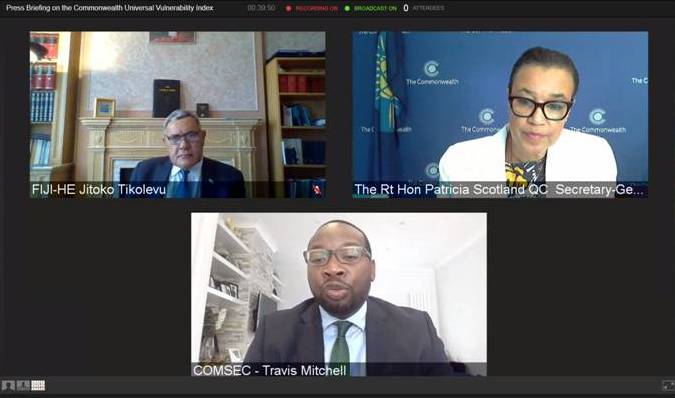
The Commonwealth Secretariat has launched a Universal Vulnerability Index (UVI) which it hopes will replace what it calls the blunt instrument of gross domestic product (GDP) measurement of a nation’s capability to deal with disasters. The UVI aims to provide a more nuanced and flexible tool for capturing the state of a nation’s vulnerability and resilience at any given time.
Speaking at the 24 June launch of the index, Commonwealth Secretary-General Patricia Scotland said that “the pandemic has been a stark eye opener” on vulnerability and resilience.
The work on the Commonwealth-offered UVI measurement model actually predates the coronavirus pandemic. Commonwealth foreign ministers asked the London-based secretariat in 2018 to work on a mechanism to help reach global agreement on a way to measure what really underpins the vulnerability of a nation. For years, small island states, middle-income countries in particular, have railed against the use of GDP as a mechanism for determining everything from aid to loans and other forms of international support.
At the UVI launch, Baroness Scotland described GDP as an outdated, “blunt, singular” and “overarching touchstone” whose usefulness had been waning in a “much more complex world”. She described the Commonwealth UVI model as providing “other more nuanced and constructive ways” to measure vulnerability.
The science
Head of economic policy and small states at the Commonwealth Secretariat, Travis Mitchell, was on hand to explain the UVI model. The Commonwealth Universal Vulnerability Index is subtitled For a Global Consensus on the Definition and Measurement of Vulnerability. It separates out measurements for structural resilience and structural vulnerability, therefore allowing a flexible ranking of a country’s ability to rebuild. It breaks down vulnerability to economic, climactic and socio-political challenges and resilience to measurements of infrastructure and policy performance. The UVI aims to chart an axis of vulnerability versus resilience. It also measures the different vulnerabilities within and outside a country’s control. The measurement then allows for a point at which a country no longer needs assistance. Mr Mitchell said the range of measurements would “add depth and greater understanding to how we allocate aid”.
The concept has been in the making since 2017, described by Travis Mitchell as the “year of the hurricane” – a period which re-ignited the debate on how to define vulnerability. Lady Scotland said that the Commonwealth team had been given the task of developing a measurement model beyond the needs of small island states which had been hardest hit in the past and which worked as a universal index with a “benchmark for rigorous analysis” for everybody.
Baroness Scotland said that the pandemic had served to bring home the message that vulnerability was around the corner for every nation. “We cannot return to business as usual …. we must overhaul how we measure development in a post-Covid world,” she said.
The High Commissioner of Fiji to the United Kingdom, Jitoko Tikolevu, told the launch that his country had been ranked as a middle-income earner. The Covid-19 pandemic had wiped out the income from tourism and remittances, included in the GDP calculation, which meant a “disconnect” between vulnerability and resilience. He said the UVI provided a “very clear and very broad” index assessment which would make it easier for countries like Fiji to “knock on the World Bank door”.
Next steps
The report was originally prepared in draft in April of this year, ready for agreement by Commonwealth Heads of Government at their scheduled meeting in June. With the postponement of that CHOGM, the secretariat launched the UVI document at this virtual media briefing on 24 June. The next step will be to seek endorsement from the G20 and other multilateral organisations over the next few months.
All the speakers at the briefing believed that the UVI measurement model is gaining traction in a post-pandemic world. Session moderator, Anne McElvoy, Senior Editor at The Economist, described it as “not letting a crisis go to waste”. Travis Mitchell said he had already heard murmurs of support for the new measurement index.
Baroness Scotland said that the pandemic had indicated what small island states, whom she called the “canaries” in the crisis coalmine over the years, had been telling the world. “Nobody saw this [coronavirus] coming,” she said, adding that the pandemic storm had left some countries in tankers, some in canoes and some without even a raft.
Stating that the GDP measurement does not work anymore, Lady Scotland said that the world needed to “have a real change … [and] a flexible tool which speaks to our reality”. She added: “The UVI is coming at absolutely the right time and speaks to the reality of small states and the increasing reality of the rest of us … We need to make sure that we can deal with the shock to create a better tool to understand and respond to the resilience that is needed”.
Click here to read the proposed Universal Vulnerability Index (UVI).



